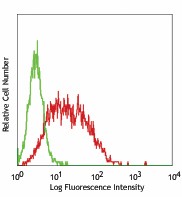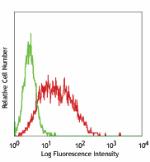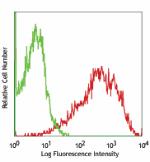- Clone
- HMN2-35 (See other available formats)
- Regulatory Status
- RUO
- Other Names
- Neurogenic locus notch homolog protein 2, Notch-2
- Isotype
- Armenian Hamster IgG
- Ave. Rating
- Submit a Review
- Product Citations
- publications

-

Mouse Notch-2 transfected cells stained with HMN2-35 PE
| Cat # | Size | Price | Quantity Check Availability | Save | ||
|---|---|---|---|---|---|---|
| 130707 | 50 µg | $183 | ||||
The Notch receptors are highly conserved from invertebrates to mammals.While Notch1 and Notch 2 exhibit the highest structural similarity among the four mammalian Notch receptors. Notch 3 has a number of structural and functional differences.The binding of Notch 3 to its ligands results in the proteolysis of Notch and movement of intracellular portions of Notch into the nucleus.This translocation triggers a series of signaling process.Notch 3 is primarily expressed in adult arterial smooth muscle cells.Notch 3 gene mutation can cause CADASIL, an inherited early stroke syndrome.
Product DetailsProduct Details
- Verified Reactivity
- Mouse
- Antibody Type
- Monoclonal
- Host Species
- Armenian Hamster
- Immunogen
- Notch 2-Fc fusion protein
- Formulation
- Phosphate-buffered solution, pH 7.2, containing 0.09% sodium azide.
- Preparation
- The antibody was purified by affinity chromatography, and conjugated with PE under optimal conditions.
- Concentration
- 0.2 mg/ml
- Storage & Handling
- The antibody solution should be stored undiluted between 2°C and 8°C, and protected from prolonged exposure to light. Do not freeze.
- Application
-
FC - Quality tested
- Recommended Usage
-
Each lot of this antibody is quality control tested by immunofluorescent staining with flow cytometric analysis. For flow cytometric staining, the suggested use of this reagent is ≤ 1.0 µg per 106 cells in 100 µl volume. It is recommended that the reagent be titrated for optimal performance for each application.
- Excitation Laser
-
Blue Laser (488 nm)
Green Laser (532 nm)/Yellow-Green Laser (561 nm)
-
Application References
(PubMed link indicates BioLegend citation) -
- Moriyama Y, et al. 2008. Int J Immunology 20:763
- Simonetti G, et al. 2013. J Exp Med. 210:2887. PubMed
- Product Citations
-
- RRID
-
AB_1227725 (BioLegend Cat. No. 130707)
Antigen Details
- Structure
- Transmembrane receptor, heterodimer consisting of a C-terminal fragment and N-terminal fragment probably linked by disulphide bonds. Contains 5 ankyrin repeats, 29-36 EGF repeats, 3 Notch/Lin repeats.
- Distribution
- Highly expressed in the brain, lung, and thymus (CD4-CD8- cells and CD4-CD8+ cells). Lower levels of expression in spleen, bone marrow, spinal cord, eyes, mammary gland, liver, intestine, kidney and heart. In spleen, Notch 2 is reported to be expressed primarily on B cells.
- Function
- Regulate broad spectrum of various cell lineage commitment process, including myogenesis, neurogenesis, gliogenesis and lymphocyte development. Mutation of Notch2 can cause a rare genetic disorder, Alagille syndrome, with multiple defects in liver, heart and other systems.
- Ligand/Receptor
- Jag1,2; Delta 1,4
- Cell Type
- B cells, Neural Stem Cells
- Biology Area
- Cell Biology, Immunology, Neuroscience, Neuroscience Cell Markers, Stem Cells
- Antigen References
-
1. Ehebauer ME, et al. 2006. Biochem J 392:13
2. Shimizu K, et al. 2000. Mol Cell Biology 20:18
3. Tanigaki K, et al. 2007. Nature Immunol 8:451
4. Kraman M, et al. 2005. FASEB J. 19:1311 - Gene ID
- 18129 View all products for this Gene ID
- Specificity (DOES NOT SHOW ON TDS):
- Notch 2
- Specificity Alt (DOES NOT SHOW ON TDS):
- Notch 2
- App Abbreviation (DOES NOT SHOW ON TDS):
- FC
- UniProt
- View information about Notch 2 on UniProt.org
Related Pages & Pathways
Pages
Related FAQs
- What type of PE do you use in your conjugates?
- We use R-PE in our conjugates.
Other Formats
View All Notch 2 Reagents Request Custom Conjugation| Description | Clone | Applications |
|---|---|---|
| PE anti-mouse Notch 2 | HMN2-35 | FC |
| APC anti-mouse Notch 2 | HMN2-35 | FC |
Customers Also Purchased
Compare Data Across All Formats
This data display is provided for general comparisons between formats.
Your actual data may vary due to variations in samples, target cells, instruments and their settings, staining conditions, and other factors.
If you need assistance with selecting the best format contact our expert technical support team.
-
PE anti-mouse Notch 2

Mouse Notch-2 transfected cells stained with HMN2-35 PE -
APC anti-mouse Notch 2

Mouse Notch 2 transfected cells stained with HMN2-35 APC
 Login/Register
Login/Register 
















Follow Us